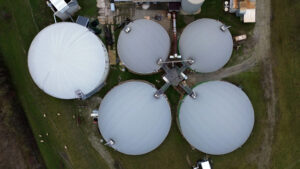
BioGas
Waste-to-Biogas: The Power of Anaerobic Digestion
Anaerobic digestion is a natural process for breaking down organic waste without oxygen, producing biogas that can then be used to generate electricity and heat. Anaerobic digestion is an eco-friendly waste-to-energy technology with many advantages, including renewable energy production, waste reduction and environmental and economic perks. As society becomes more focused on protecting the environment and reducing greenhouse gas emissions, anaerobic digestion is expected to become an even more vital technology for waste management and energy production. Furthermore, with research and development efforts ongoing, anaerobic digestion should become even more cost-effective and efficient, making it an attractive solution for both.
How Anaerobic Digestion Works?
Anaerobic digestion involves a series of biological processes that take place without oxygen. It begins with collecting and processing organic waste materials such as food waste, animal manure and sewage sludge before mixing it with water and feeding it into a sealed tank for further biological reactions. Once there, microorganisms break down organic matter in the waste to produce biogas consisting primarily of methane and carbon dioxide that can then be captured to generate electricity or heat through the combustion of methane gas production, with any leftover organic material being utilized as fertilizer or soil amendment by nature itself.
Benefits of Anaerobic Digestion
Anaerobic digestion offers several benefits over other waste-to-energy technologies:
- Anaerobic digestion produces renewable energy in the form of biogas, which can be used to generate electricity and heat. This can help to reduce reliance on fossil fuels and lower greenhouse gas emissions.
- Anaerobic digestion can significantly reduce the volume of organic waste, which can help extend landfills' lifespan and reduce the need for new landfill sites.
- Anaerobic digestion can help to reduce greenhouse gas emissions by capturing methane gas, a potent greenhouse gas, and converting it into energy.
- Anaerobic digestion can provide economic benefits, such as creating jobs and reducing the cost of waste management.

Potential Applications of Anaerobic Digestion
Anaerobic digestion can be used to treat a wide range of organic waste materials, including:
- Anaerobic digestion can treat food waste households, restaurants, and supermarkets generate.
- Anaerobic digestion can treat animal manure and other organic waste generated by agricultural activities.
- Anaerobic digestion can treat organic waste generated by the food and beverage industry and other industries that produce organic waste.
- Anaerobic digestion can treat sewage sludge, a by-product of wastewater treatment.
